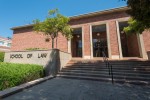The bar is set too high for law students trying to pass the California bar exam. And the reasons are bafflingly pointless.
In order to be a practicing lawyer in California, one must pass the bar exam, a multiday test consisting of multiple choice and essay questions, to be licensed by the state. Students typically take the bar exam upon graduating law school, often with job offers from law firms in hand, expecting to pass and become newly minted lawyers.
Those expectations are cut short by the staggeringly low pass rate of the California bar exam.
The score required to pass the bar – called the cut score – determines whether a student can start their law career, and varies from state to state. California imposes a stricter cut score than any other state except Delaware, requiring a score of 1,440 out of 2,000, while most states’ average around 1,350. Put differently, nearly six out of 10 prospective lawyers failed the July California bar exam, resulting in a pass rate of 40.7 percent – a 67-year low for the summer test in California. Just five months before, the pass rate hit an all-time low of 27.3 percent.
There are serious consequences to this. As Raquel Aldana, associate vice chancellor for academic diversity at UC Davis, wrote in an article on the campus’ Equity and Inclusion site, when would-be lawyers fail the California bar exam, their lives are upset and many lose their jobs or have to delay their legal professional lives.
Following the July exam, deans from 19 out of California’s 20 American Bar Association-accredited law schools pleaded for the State Bar of California to lower the cut score. And this isn’t the first time deans and law students have complained.
These concerns have often gone ignored, with the state bar insisting on maintaining the exclusivity of being a lawyer in California.
But lowering the cut score would not be making the test any easier for students – it would simply make it reasonable. California students on average tend to do better on the exam than students in other states. Besides, most students who fail the first time simply take the exam again, meaning the tight threshold does nothing but force those who do not meet the cutoff to spend exorbitant amounts of money until they do.
Making students jump through hoops does not evaluate their ability to practice law. And the current cut score does not produce better lawyers but excludes perfectly capable ones.
In response, the California State Bar launched four investigations into the exam, reaching conclusions that make little sense and seem to allow it to avoid making changes to the status quo. The state bar found law schools were admitting students with lower LSAT scores and lower GPAs, possibly explaining the subsequently lower scores on the bar exam and the decline in pass rates.
But as Jennifer Mnookin, the dean of the UCLA School of Law, wrote in a UCLA Newsroom opinion piece, this finding can only explain a fraction of the problem – which isn’t unique to California – and does not explain the state’s abnormally low pass rate and the state bar’s insistence on keeping the threshold out of reach. The state bar has concluded that further studies are necessary before any changes can be made.
It might seem that there are too many lawyers in California and keeping the bar exam pass rate low is an effort to ensure that only the best of the best make it into the field. But the bar exam does not even weed out bad lawyers effectively, Aldana writes.
For example, in New York, where there are 177,035 practicing lawyers – outnumbering California’s 170,044 – the pass rate was 63 percent in July, much higher than California’s 40.7 percent at the time.
“This result might make sense if the California bar exam actually did a good job of excluding incompetent lawyers from the profession,” Aldana wrote. “Unfortunately, especially in California, the bar exam largely fails in this important task.”
Moreover, if California had a cut score of 1,350, which is comparable to that of other states, it would have nearly double the number of African-American lawyers – in a field desperately seeking diversity. Keeping the cut score arbitrarily high does not serve anyone, especially when the same people failing the exam in California would be deemed competent lawyers by any other state.
Tests themselves are shaky measures of future career performance. Law school alone is an undertaking. If students can graduate from it and perform well enough on the exam to be considered a lawyer in any other state, there is no reason California test-takers should be penalized.
The Golden State’s cut score is pushing out graduates who would make perfectly capable lawyers. And prolonging students’ entry into the workforce while they wait to retake the exam does little, if anything, to produce better lawyers.
Until that changes, students planning on taking the bar exam will be better off planning their argument with the state bar instead.
